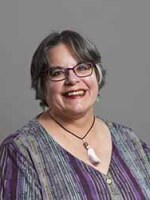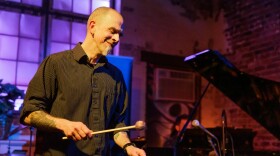Celebrating his new album with a two week tour through the Pacific Northwest, Dmitri Matheny will join us for a KNKX Studio Session on July 19.
In an interview with jazz reporter Robin Lloyd, he spoke about "Cascadia," getting back on the road after COVID shutdowns, and his mentor Art Farmer.
On coming back to touring after pandemic shutdowns:
"We had a couple of years where there was nothing. And then I booked a big tour of the desert southwest, and about half the shows got COVID-canceled. And I went ahead and did it anyway. I took my dog Scout and we went all the way to Santa Fe, New Mexico, and back. And then most recently, we went through California and Arizona and back, and now we're staying in the Pacific Northwest for a couple of months, which is good.”
In 2016, Matheny moved from Arizona to Centralia, Wash. The new album "Cascadia," is a tribute to Matheny’s newer home of the Pacific Northwest. He feels grateful to be here.
“Especially now. I mean for one thing, we're lucky to not be in a country where there are bombs raining down from the sky. And any of us who've survived this pandemic are lucky, too, for our health.
The Pacific Northwest is so beautiful. And I've always loved it here. I love the land, I love the people. I've always felt really welcome in this community.
Honestly, the new recording, I didn't set out for it to be any kind of a special tribute or anything, but it just kind of evolved that way. I mean, I've got a song on there, Wichita Lineman, which has nothing at all to do with the Northwest. It was just a favorite song of my father's, you know? But certainly the musicians and the vibe and the atmosphere and the ethos of what we're trying to do with it, I think, is very much a Northwest kind of thing.”
"Cascadia" also contains a reprise of Matheny’s film noir style, and a bit of bossa nova. He’s particularly glad to have recorded with Seattle-based pianist Bill Anschell.
"He is so amazing. He's the best. I mean, actually, one of the things that I really feel was especially successful about this project was that Bill has this ability to create orchestrations on the fly, as if he's a full orchestra. And I think it's because he spent a lot of time playing behind vocalists, you know, or being the lead in his trio. So he does this thing, and the drummer, Mark Ivester, does a similar thing, with every new chorus, every time the song cycle comes around again, they're changing up the groove, changing up the texture, or Bill changes the harmony. It's fun for me because I write these little sketches and then he develops all of this lush, rich harmony around it, and I go, Okay, I'll take credit for that!"
Appropriately enough, the Cascadia album is on Seattle’s Origin Records.
"They're good people. It's my first project for Origin, and so far, it's just been a delight to work with those guys."
Matheny has no plans yet for his next album, or his next tour, but he’s excited about a new project with guitarist John Stowell.
“We've been exploring Brazilian music together. Neither one of us is an expert, but John knows an awful lot about it. And it's an interesting thing: a guitar and flugelhorn duo, playing bossa nova and samba and whatnot, without the benefit of percussion, and having to imply all of the bossa nova rhythms and grooves and feels and everything. I'm learning so much, I'm really enjoying that project. I want to explore more of that.
Honestly, when the shutdown first happened, I realized that I had just been hustling and going and going and going for years. Then, with all of that time at home, I planted a garden and I started going fishing. I've never in my life really explored hobbies or anything like that. And so one of my great takeaways, now that things are opening up again, is that I actually don't want to work as hard as I was working before, I want to make time for just hanging out at home and spending time with my girlfriend Sassy and the dogs.
I actually think that I'll be a better artist because of it, because, you know, you can't just fill your schedule with art and business and never have room for, I don't know, life…like going to the comic book store.”
About his mentor, flugelhornist Art Farmer:
"I wonder what Art would think of this Cascadia project. When I released my very first CD back in 1995, he was so sweet about it. He said, ‘This record sounds so good. I wish I'd made it myself.’ And I said, ‘Oh, that's really kind of you, but give me some constructive criticism.' So then he said, ‘Well, if it were up to me, I'd like to hear some more bass solos, and have the drums a little more present in the mix. But that's just a matter of taste.’
Art was fantastic. He was so generous. He was so kind. I felt personally very grateful he was my great friend and mentor, and I was his protégé. I had this incredible opportunity to shadow him for a number of years.
After Art died, I met a dozen other people who’d had the same experience, among them, Ingrid Jensen. Art was her biggest fan. In fact, one of the things that he said to me was, ‘You've got to take more chances. Listen to Ingrid. She's out there on the high wire. You've got to get out there, you're playing a little too safe.'
And he would probably have that to say about this recording, too, because it is kind of a controlled, more of an elegant, as opposed to a searching, kind of approach.”
In these times, maybe that's just what we need.
“I'm not an activist by any by any means. But I remember when I was in school at Interlochen, we had this history teacher who said, ‘A lot of what we're studying here is the culture of destroyers, kings and warriors and people that have conquered this country and that; and these are the people who write the history. But don't forget, we also have the history of art and culture.'
And then, in a very Interlochen moment, she leans across her desk and she says, ‘And all of you ‘gifted youth,’ all of you must decide whether you want to be a destroyer or a creator!’
It was very heavy, but there is a kernel of truth in that.
I've been kind of a news junkie these last few years, with all these things that have been happening in politics and in the world. And I find that I really, really love having these moments that are just about a pure thing. You know, taste this wine, listen to this music, look at this sunset, that kind of stuff. It's become exponentially more valuable.
I hope the music brings people some comfort.”
Find more information about Dmitri Matheny's Cascadia tour here.







